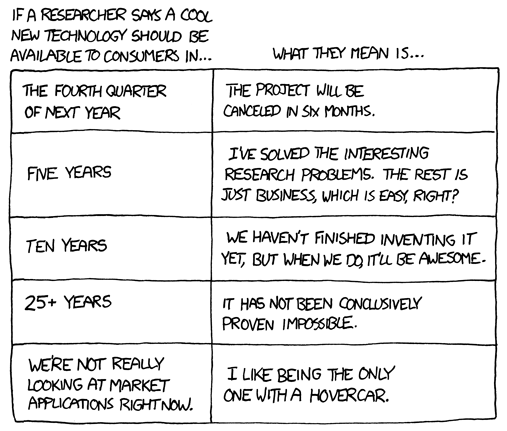Difference between revisions of "678: Researcher Translation"
(→Transcript: Instead of confusingly describing a table, why not just make this transcript into *gasp* a table?) |
(Undo revision 76304 by 173.245.54.152 (talk) The transcript is all text so that the visually impaired can see the comic. There's not much reason to include it otherwise.) |
||
| Line 23: | Line 23: | ||
==Transcript== | ==Transcript== | ||
| − | + | :[A table showing two columns. The left column is labeled "If a researcher says a cool new technology should be available to consumers in...", and the right column is labeled "What they mean is..."] | |
| − | + | :[The fourth quarter of next year - The project will be canceled in six months.] | |
| − | + | :[Five years - I've solved the interesting research problems. The rest is just business, which is easy, right?] | |
| − | + | :[Ten years - We haven't finished inventing it yet, but when we do, it'll be awesome.] | |
| − | + | :[25+ years - It has not been conclusively proven impossible.] | |
| − | + | :[We're not really looking at market applications right now. - I like being the only one with a hovercar.] | |
| − | |||
| − | |||
| − | |||
| − | |||
| − | |||
| − | |||
| − | |||
| − | |||
| − | |||
| − | |||
| − | |||
| − | |||
| − | |||
{{comic discussion}} | {{comic discussion}} | ||
[[Category:Charts]] | [[Category:Charts]] | ||
Revision as of 22:57, 25 September 2014
| Researcher Translation |
 Title text: A technology that is '20 years away' will be 20 years away indefinitely. |
Explanation
This comic suggests a translation from the statements of the researcher of a potential new technology. These statements might be found in, for example, an article in a popular science magazine which highlights some cutting-edge research. It reflects the idea that researchers tend to be too optimistic about the future of their research project.
"The fourth quarter of next year": Even if a technological development seems very close to completion, it could still be canceled by some authority other than the lead researcher. This might be due to poor management, or a poor business plan, or even a poor scientific basis which the researcher is hiding or ignoring.
"Five years": The researcher has solved the interesting scientific problems, and assumes that the concept could be picked up by a business, developed to be usable outside of a research lab, designed into a prototype, have a manufacturing process, marketed, and made available to consumers, in only five years. In reality, a lot of exciting-sounding technology may not reach consumers for many years because of difficulties in the business side of things.
"Ten years": Not only does the researcher assume that the business end of things will go smoothly, he also assumes that the rest of his research will go smoothly. In reality, a lot of unforeseen problems could arise during research.
"25+ years": The researcher further assumes that this technological application is scientifically possible.
"We're not really looking at market applications right now.": In contrast to the above chain of assumptions, in this case the researcher has a working technology but wants to keep it to himself.
Title text: "20 years away indefinitely": Sometimes the technological or engineering challenges for a certain application seem like they could be overcome in 20 years, but in reality the challenges are very difficult. The more the challenges are studied, the harder they are found to be, although there is always hope that a few more advances will do it. An example is fusion power, which has been conceptualized since at least 1946 as a potentially unlimited source of clean energy, but remained an elusive achievement despite projects such as the National Ignition Facility and ITER. The first commercial plant is still indefinitely 20 years away.
Transcript
- [A table showing two columns. The left column is labeled "If a researcher says a cool new technology should be available to consumers in...", and the right column is labeled "What they mean is..."]
- [The fourth quarter of next year - The project will be canceled in six months.]
- [Five years - I've solved the interesting research problems. The rest is just business, which is easy, right?]
- [Ten years - We haven't finished inventing it yet, but when we do, it'll be awesome.]
- [25+ years - It has not been conclusively proven impossible.]
- [We're not really looking at market applications right now. - I like being the only one with a hovercar.]
Discussion
This does explain a lot, doesn't it? --Jolbucley (talk) 03:40, 29 January 2014 (UTC)
Why is this explanation so pessimistic, I don't think this is what Randall was trying to get at. -Vctr
By 2001, we should have lunar colonies and manned missions to the outer planets... Mountain Hikes (talk) 01:07, 17 December 2015 (UTC)
No in 2001 we should have had Spaceships capable of committing murder and regular flights to the moon. Not sure if you would consider that mission to Europa/Jupiter successful. 108.162.216.166 12:06, 2 August 2017 (UTC)
The first commercial fusion plant is indefinitely 20+ years away? We will ‘’’eventually’’’ get flying cars, lunar colonies, and energy-efficient commercial fusion plants, at least within this century. It has been heavily proven that commercial fusion plants will be technologically capable to deliver energy at a rate above 100% of the energy put into it. Sure, in December ‘09, it was indefinitely 20+ years, but now that estimate is now definite, as thirteen years have come by and research has been done. SilverTheTerribleMathematician (talk) 06:25, 8 December 2022 (UTC)
